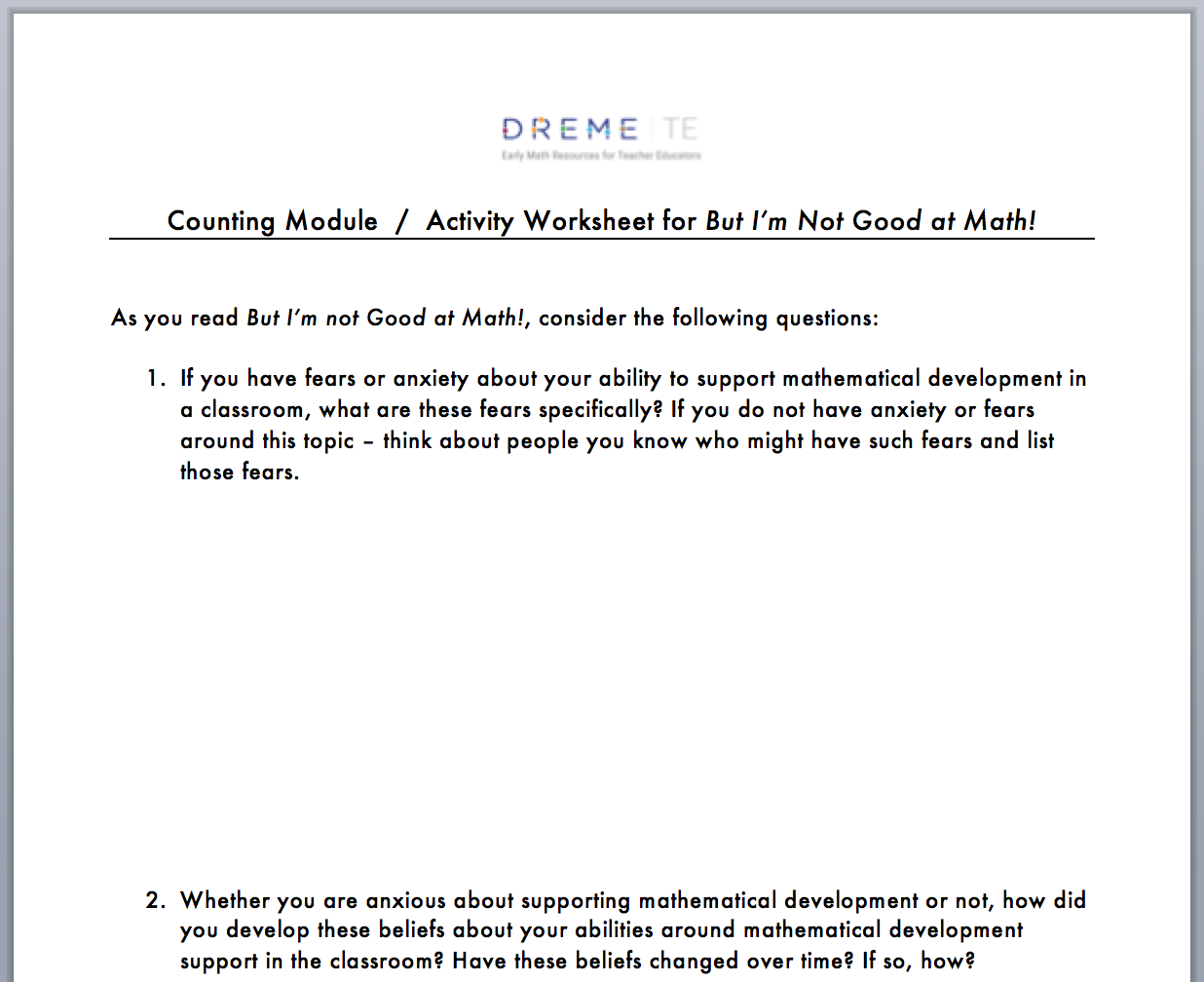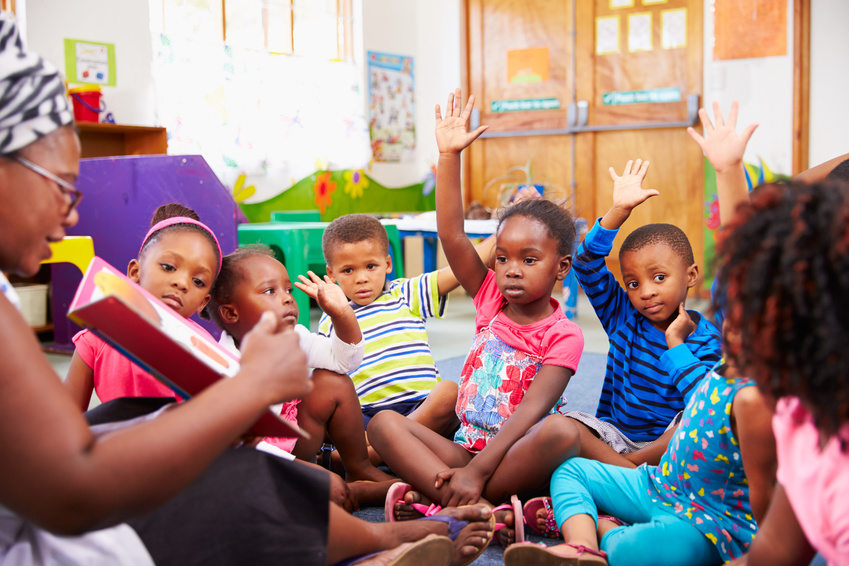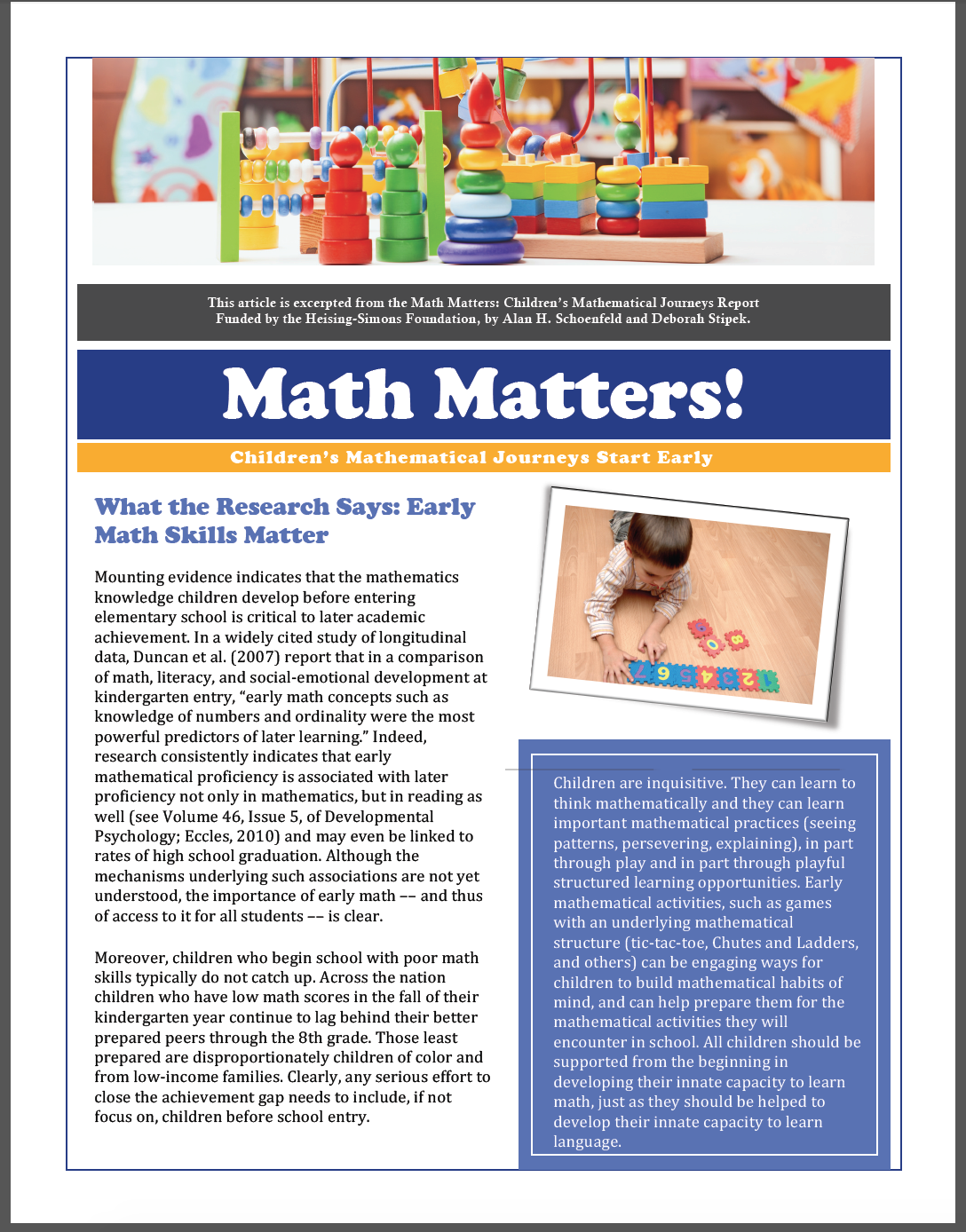This is a story of participants who think that they are not good at math and are not enthusiastic about teaching it. They learn that early math education is important and become ready to move forward in a positive way.
Not a Choice Anymore
Alysha co-teaches a mixed-age group of three- and four-year-olds at a publicly funded preschool. She has worked in this classroom for almost 15 years and is wildly popular with parents and children. Two years ago, Raquel replaced Alysha’s previous co-teacher. Raquel had just graduated from the state college nearby and came with lots of up-to-date techniques and knowledge about the latest  research on early childhood curriculum and development. The two hit it off and not only teach together, but their families spend a lot of time together as well, with Alysha and her husband serving as fun and engaging surrogate grandparents to Raquel’s two young children.
research on early childhood curriculum and development. The two hit it off and not only teach together, but their families spend a lot of time together as well, with Alysha and her husband serving as fun and engaging surrogate grandparents to Raquel’s two young children.
Recently, the state preschool standards were revised and during naptime one day, Raquel and Alysha were looking at how well their curriculum lined up with the revised standards. They were dismayed to learn that while the old standards and curriculum frameworks supported learning mathematics almost exclusively through unstructured play, the new standards and frameworks recommended the use of teacher-guided instruction that scaffolded mathematical development and a mathematically rich vocabulary. Neither teacher was comfortable with the idea of having to teach math, in part because that was not what they were trained to do and in part because they didn’t feel comfortable with math themselves. With time, their initial distress was replaced with enthusiasm. The following pages show how Alysha and Raquel became advocates of structured math learning in their classrooms and in the children's homes.
Alysha and Raquel had taken workshops on supporting math in the classroom before, but somehow they just weren’t enough to get them started on teaching the state standards. So they enrolled in an early mathematics development course at a nearby community college. What follows is an interview with both of them a few months after the course ended.
How did you feel about math when you first started taking the course?
Alysha: Well, it had been so long since I had taken math myself in school, and I never really understood anything past pre-algebra. So I was really nervous. I wasn’t sure that I could learn math. So basically, I was scared to take a chance. I mean, who wants to learn that they really aren’t able to learn something?
Raquel: I had to take math in college in order to get my bachelor’s degree, and I made it through with the help of some really good tutors. But I had no idea how children learned math. And I definitely wanted my students to have a different experience than I did. I know there are people out there who like math. It’d be great if my students grew up to like math too!
How do you feel about math now?
Alysha : I’m actually thinking about going back and taking a math class for me! Isn’t that weird?? What I learned is that children need a really good foundation in math, starting when they are really young. I didn’t have that. But I know that if I had had a teacher who knew how to support math when I was in preschool, I would have liked math so much better.
Raquel: It was so nice learning that I wasn’t dumb in math. I just didn’t get a good start, just like Alysha. I’m determined to make sure that the children in our class have a different experience than I did!
Alysha : And we’ve talked about how we don’t need to know calculus to teach preschool math.
What do you need to know?
Alysha: First, it is really important to know what each child already knows about math. That way you can build on the knowledge that they already have. Otherwise, whatever you are trying to teach might not make sense to them. And, it has to be hands-on; young children learn math best when they can manipulate objects.
Raquel: Yeah, that was a big relief. I thought that “teacher-guided instruction” meant that we had to do worksheets and stuff like that. But we all worked together in the course to create activities that were meaningful and really fun for the children.
Alysha: And math can happen all over. One of the activities they showed us in class was sort of a musical chairs game on the playground. Children would walk around a bunch of large geometric shapes drawn in chalk on the playground and when the music stopped they had to step into a shape, but the number of children in each shape had to match the number of sides of the shape. They want to play that game all day!
Raquel: We also learned that while children don’t all earn math concepts in the exact same order, there is generally some sort of order to learning. That makes it a little easier to figure out how to scaffold them to master the next level in the trajectory of math skills. Like when they know how to count verbally to 10, but can’t count a set of objects bigger than four. You can find fun things that they like counting, and then provide games and activities that make counting useful. Like if they are sharing a set of 10 cars, they can divide them up into two sets of five and then make sure that it is fair by counting. Something they really care about!
How much math do you think you need to know in order to teach math in preschool?
Alysha: The answer to that is complicated. I used to think that I didn’t know enough math to teach it to children, but it turns out that I knew all the math that I needed! The part that I didn’t know was how children learned math. The mathematics part isn’t hard, although incorporating and appropriately using mathematical vocabulary was challenging at first. But now I think it's fun to learn and teach new terms. Last week, I introduced rectangular prism. They loved that one! Kind of like learning a word like pterodactyl! And like we said earlier, knowing what kind of math to teach next can be complicated, but this course really helped.
What are your plans now?
Raquel: Both of us have been working on a math curriculum for next year. We are making sure that we have time to assess where children are in the beginning of the year through observing them in some activities and games that we are planning.
Alysha: Yeah, and then we have a bunch of activities at all levels of development and a way to keep track of children’s progress.
Raquel: We are making sure that we have math all over the place: we have play dollar bills in the pretend play area, hopscotch and number games on the playground, fair-sharing during snack time, and we always have one or two math activities during center time! We’ve been trying out these activities and tweaking them to make them better.
Final words?
Alysha: Math is really important, not only as a foundation for school math but also for all kinds of learning, even reading! If anyone reading this is anxious about math, trust me: it will be okay! If I can support math in the classroom, so can you!
Raquel: Alysha is right: math is really important. And taking a math development course is really useful. Not only do you feel more confident about doing a good job of math in the classroom, but the class also helps you think about how children learn math and teaches you lots of fun activities that the kids love. Funny, I used to be scared of it, but now math is one of my favorite things to do in our classroom.



